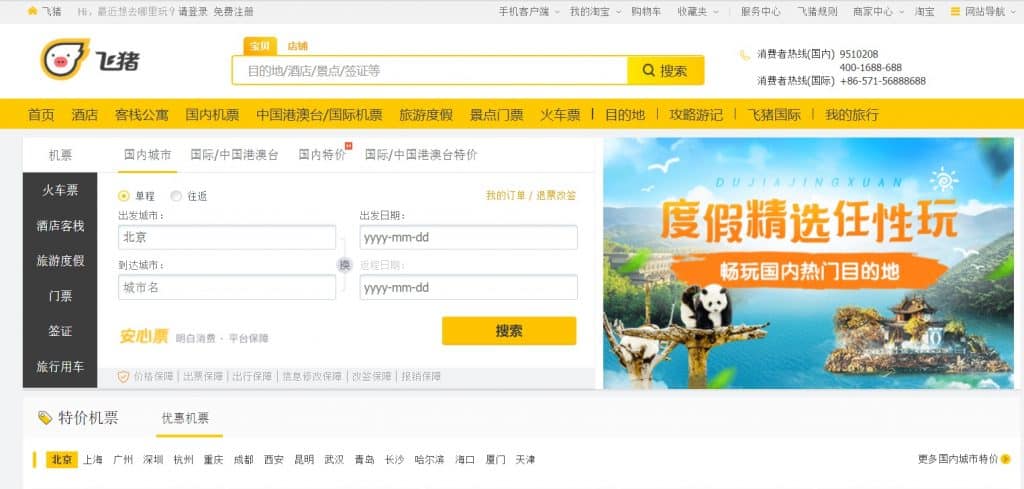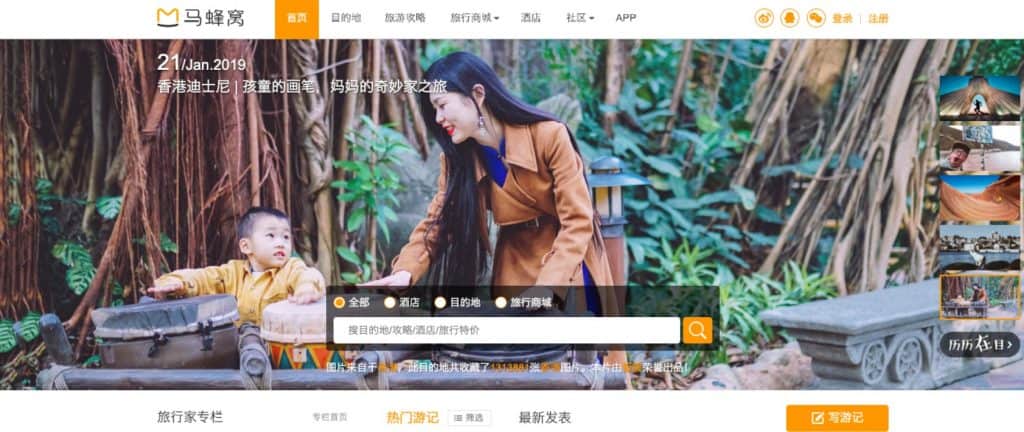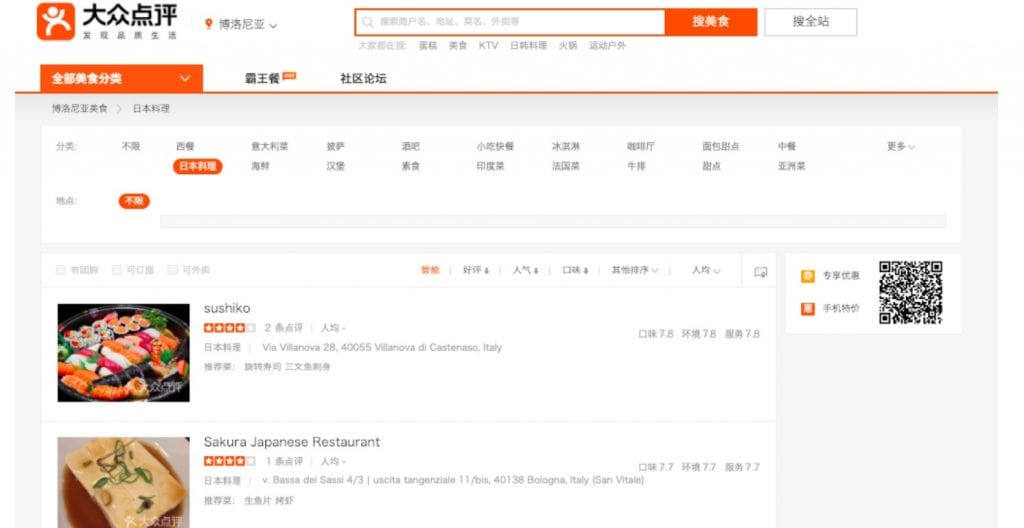Best Mobile App for Chinese Tourists
In the era of e-tourism, mobile applications dedicated to travelers’ journeys are very important to build a marketing strategy. What are the favorite mobile applications of Chinese tourists in 2020?
Let’s discover them together:
WeChat, to communicate with Chinese Tourists
WeChat is the Chinese super-app used to send messages, do video calls, pay, book holidays, book a medical exam, and so on. If you want to attract Chinese tourists you have to be present on this social media. You can create a service official account, that allows you to send 4 push notifications every month to your followers. WeChat is the app on which the Chinese spend most of their time. It is thus the best way to offer your brand visibility and create a community that will follow you.
Thanks to its countless tools, you can always be in contact with your community.
Fliggy, the promotions on the planes
Fliggy, formerly known as Alitrip, is a travel platform designed for millennials, who make up a significant portion of the 100 million Chinese travelings internationally each year. It brings together all the good deals and promotions on flights. It allows buying tickets at a much cheaper price.
The mobile app is a one-stop-shop for travel services made possible through partnerships with major airlines, ticketing, and travel agencies. There are over 200 million registered users worldwide.
Youdao Translate, the translator to be understood by Chinese tourists
Literally “I have the translation”, this application is extremely useful for communicating with someone who cannot speak your language at all. It allows you to record your voice and to get an audio translation, but also to take a picture of a text or a panel and have a written translation.
Small disappointment, the only consistent translation is the one from Chinese to English. Even if Youdao offers about 60 languages, translation into other languages is done word by word, which can get quite confusing.
It remains very effective and many Chinese people use it.
Alipay and Wechat pay, the Chinese digital wallet
Did you know that the mobile apps Wechat pay and Alipay have both developed an “Air & Rail” section that allows users to book hotels and airline, bus or train tickets directly through their digital wallet?
While Europe still fears frauds and is wary of sharing personal data, the Chinese commonly use these digital payment applications in their daily life. Applications are linked to their identity card and bank account and their use allow saving a lot of time to the users.
Even when traveling, the Chinese prefer mobile payment via their QR code with Wechat or Alipay in order to not lose time changing money.
Any tourism operators(hotels, restaurants, shops) who want to attract Chinese consumers should therefore be equipped with these possibilities of payment.
Ctrip, the number 1 app for travel reservations
Ctrip is the best-known Chinese online travel agency. This application took off with the strong demand for Chinese tourism, due in large part to the introduction of golden weeks some few years ago.
It is very complete: it allows booking organized trips but also air tickets, train tickets and accommodation.
Finally, it is the first platform on which Chinese netizens will deliver their feedback, crucial for the e-reputation of tourism operators.
Baidu Maps, Chinese online mapping
Since Google doesn’t work in China, Chinese tourists will use Baidu maps for its GPS function. It is simple, but you better reference your accommodation on Baidu if you target the Chinese guests!
Its use outside Asia is still limited and lacks updates but it is a big plus if your hotel or restaurant or shop appears on Baidu Maps.
Chinese name: Bǎidù dìtú 百度 地图
“Where is the Public Toilet” to keep up with Chinese habits
Launched at the beginning of 2018, the tourist toilets navigation system developed by the National Tourism Administration (NTA) and online mapping service provider has received 15 million visits from mobile users across China. Given the size of its population, China has set up public toilets every hundred meters or so. Every public garden – even a small one – or subway station – even a secondary one – has its own.
The Chinese on vacation are therefore confused by the lack of infrastructure or clear indications.
By tapping a button on the Amap smartphone app, users can see all public toilets within 2 km of their location and receive the recommended shortest routes.
That’s why the use of this mobile application which, as the name suggests, lists on an online map the closest public toilets can be essential for your business!
Qyer and Mafengwo, the shared experience app to advertise your brand
Because tourism is a question of social prestige, it is essential to be able to share one’s experience, such as traveling abroad, via social networks. Publishing your experiences as a journal is therefore very attractive and many Chinese tourists go through Qyer, Wechat, and Mafengwo.
Qyer.com meets the needs of independent travelers, with more than 5 million registered users. Its functionalities include venue listings and reviews, travel diaries created and posted by users, and a Q&A forum. In 2009, Qyer started publishing professionally written, free-to-download guides, called Q Guides. In addition to destination guides, there are also themed guides, including cycling tourism, duty-free shopping, and solo female travel.This guide includes tips on responsible travel generally, with specific area guides. There is a significant amount of cultural information as well as environmentally responsible tourism tips, advice on sustainable transportation (cycling and trains, for example), and volunteer tourism.
To give some examples about cultural advice, in the Responsible Travel guide’s section on Europe, it explains the importance of punctuality in Northern Europe, of queuing, of saying thank you, of respecting others’ personal space, of respecting facilities reserved for people with disabilities, and how you should not confuse Ireland with the UK, or Scotland with England.
On the other side, Mafengwo allows you to consult forums, feedback, reviews of all kinds, which the Chinese write as a result of their travel experiences (especially those abroad).
For information on hotels, flights, trains, destinations, the Chinese refer to this platform. The modern Chinese traveler, in fact, consults a lot of forums and reviews, in order to find as much information as possible to compare and choose the most congenial solution to his needs.
Mafengwo has about 120 million users (100 million actives per month), a Q&A engagement level of over 700,000, over $ 1.5 billion generated by transactions on the App.
Meituan, to find a restaurant and to review places
Meituan is a Chinese super-app that offers the following possibilities:
- Book your trip and/or activities to do during the trip itself (such as booking.com for example);
- Commercial promotions (with coupons). The coupon system is very popular with Chinese users;
- Group purchases for special discounts ;
- Food delivery but with GPS-based delivery (this means that the user is precisely located and can receive the delivery even if he is sitting on a bench inside a park);
- Reviews of places, both in China and abroad.
The typical user of the platform is young (59% were born in the 90s), mostly female (65% of the total) and 54% comes from cities in the first bracket. 71% of them are white collars and, therefore, people with high culture and spending capacity.
Elong and Qunar, two booking apps
Literally “Where to go”, Qunar is similar to the Ctrip app where you can book flights and accommodation and enjoy great promotions.
Less important, Elong is also an online booking agency to book transport and accommodation; it is a well-known partner of Expedia. The site partners with several international chains, including Marriott, Hyatt, and InterContinental. The site’s partners are the most expensive ones, but eLong boasts permanent discounts and special promotions from time to time.
Didi and Uber, book a taxi without worries
Mobile taxi apps make life easier for Chinese travelers [in China]: Both apps compete fiercely to increase their market share.
The principle is the same: geolocate the nearest taxi, which picks up the user at its exact location. No bad surprise: the journey time and the costs are calculated in advance. The debit is done automatically because the service is connected to the Alipay or Wechat portfolios. The user can follow the path of the car on the map of the app and note his driver once his service performed.
So what do you think is the most practical application of this list?
It is essential for any tourism operator targeting Chinese customers to know the best mobile applications in China and to move to digital.
Gentlemen Marketing Agency is an agency specialized in digital marketing. We help you better understand the needs of Chinese tourists. To find out more about our services, find our digital solutions here.
Read also:
- How to attract Chinese tourists to Normandy
- Vacation Rentals Market in China
- How to Market your hotel for Chinese travelers?













I really love to use all the apps but am particularly interested in apps that can connect me to potential chines tourist. i am a tour operator in Uganda.
Hello
This apps are gonna be a great help for my next trip
im so excited to get to use all of them.